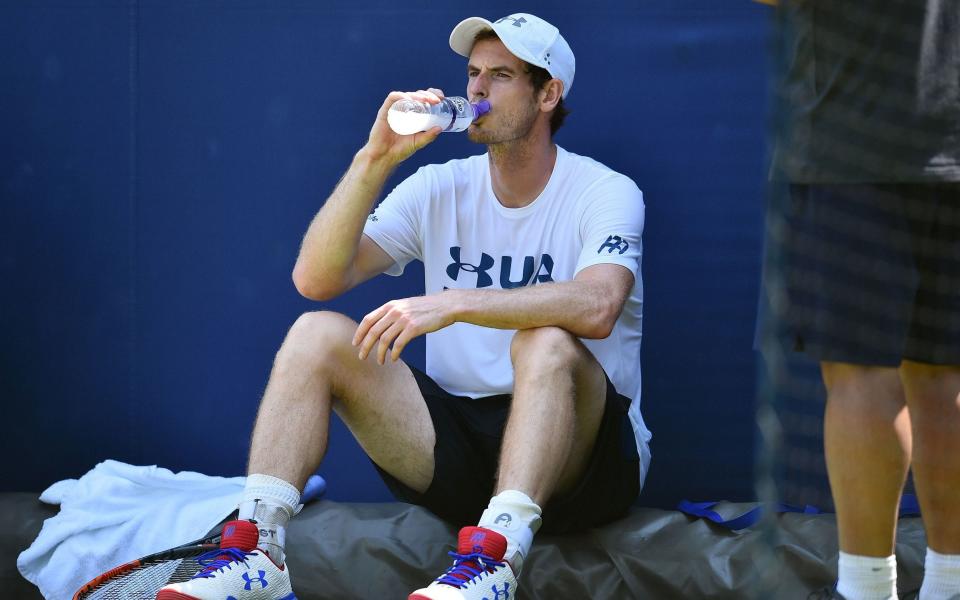Andy Murray plans to donate his Queen's prize money to Grenfell Tower disaster victims

Sir Andy Murray is planning to donate his entire prize money here at Queen’s Club this week to the families who lost everything in the Grenfell Tower disaster. It is understood that the world No 1 will hand over his cheque, which could be as much as £346,000 if he wins his sixth title on these lawns on Sunday, to the victims of one of Britain’s worst peacetime fires, in which at least 79 people are known to have died.
As is customary for Murray, he seeks no publicity for the gesture. He has attached himself to several causes, not least last weekend’s ‘Great Get Together’ to honour the memory of murdered Labour MP Jo Cox, and expects nothing in return. But the Grenfell tragedy has affected him deeply, to the point where he intends to use his appearance at Queen’s – which lies just two miles from the burnt-out tower block – to contribute to the relief effort. Several firefighters who attended the inferno work at Queen’s every year as casual staff.
It is not the first time that Murray has turned this spectacle into a platform for charitable endeavour. In 2013, he donated his Queen’s winnings to the Royal Marsden Hospital, where his friend Ross Hutchins was then being treated for cancer. He also helped stage a Rally Against Cancer that featured Boris Johnson, actor Eddie Redmayne and comedian Michael McIntyre. When it was confirmed that Murray would receive a knighthood last December, the citation read “for services to tennis and to charity”.
The example is one he owes, to a large extent, to his mother. Judy Murray, who was made an OBE in the Queen’s Birthday Honours last week, has long backed the Prince’s Trust, looking after disadvantaged teenagers, and created packages around tennis at Wimbledon and the O2, where she hosts the Trust’s supporters.
This season Murray has made a concerted effort to support Roger Federer’s fundraising work, fulfilling a commitment that he made to the 18-time major winner to play in the Match for Africa in Zurich in April. He even invited a ball-boy to take on match point. The two are facing off again for the same cause in Glasgow this autumn.
Before he can even entertain the prospect of a third consecutive Queen’s triumph, Murray must first surmount the challenge on Tuesday of fellow Briton Aljaz Bedene, whom he beat in the third round last year. It did not sound as if Bedene, who has been considering switching his Davis Cup allegiance back to his native Slovenia, was harbouring much hope of an upset.
“Andy’s always dangerous,” he said. “His best surface is grass – he didn’t lose on it all last year, and only once the year before. He has great movement, great returns, he is fighting to get every ball back. He’s just awkward to play when he gives everything on grass.” Just how deeply the respect ran was clear when Bedene said: “He is the favourite for Wimbledon.” Above even Roger Federer? “Yeah.”

Soon enough, Murray could find himself the only home player left in the draw, after Kyle Edmund lost 6-7 (4-7), 6-4, 4-6 on Monday night to Canada’s Denis Shapovalov. It was an intriguing replay of the pair’s dramatic previous match-up, at the Davis Cup in Ottawa, in which Shapovalov struck umpire Arnaud Gabas with a forehand leathered so hard that the French official required eye surgery.
On that occasion, the hot-tempered teenager had been losing by two sets to love en route to being defaulted. This time, Shapavolov, the Wimbledon junior champion, turned the form guide on its head to vanquish the British No 2, who was ranked 146 places higher. Of the dark memories of facing Edmund across the net before, he said: “I don’t think I’m ever going to forget about it, but this was just a different match – it wasn’t in my head at all. It’s one of my biggest wins.”
In oppressively hot conditions in West London, Edmund struggled against all elements of the Shapovalov weaponry, from the swinging leftie serve to the piercing single-handed backhand. He hardly aided his own cause, either, hitting two double-faults in the deciding game. “We both played aggressively,” he said. “We both have quite similar styles. It’s my first match on grass coming off the clay, so you don’t expect to play your best, and I didn’t. There were areas where I could have been a lot sharper. It can only get better after this.”

 Yahoo Sport
Yahoo Sport 





































